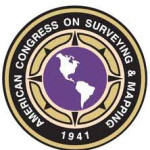- Branża: Earth science
- Number of terms: 93452
- Number of blossaries: 0
- Company Profile:
Founded in 1941, the American Congress on Surveying and Mapping (ACSM) is an international association representing the interests of professionals in surveying, mapping and communicating spatial data relating to the Earth's surface. Today, ACSM's members include more than 7,000 surveyors, ...
A manufacturer's term for the spindle or spindles which are upright when the transit is in use and about which the transit or a part of the transit rotates. The engineer's transit has two such spindles: an inner spindle to which the alidade is attached, and an outer spindle to which the horizontal circle is attached and which is hollow and rotates on the inner spindle.
Industry:Earth science
(1) The process of applying, to a measured or calculated value of gravity, the sum of a spherical Bouguer gravity correction and a topographic gravity correction. (2) The sum of the gravity corrections mentioned in the previous definition.
Industry:Earth science
A calendar in which days are inserted or removed from time to time to make the length of the calendar year agree better with the length of the tropical year. Tropical year and the mean solar day are incommensurable, so any calendar year containing an integral number of mean solar days must therefore fall short of or exceed, by a fraction of a day, the tropical year.
Industry:Earth science
A device which indicates magnetic north by means of a magnet suspended at its midpoint is such a way that the magnet aligns itself with the local magnetic field. That end of the magnet which points in the general direction of local magnetic north is marked. The magnetic compass used in surveying generally has the shape of a large, flat pillbox with a glass top. Inside the box, the bottom is marked with a graduated circle centered on the pin supporting the magnet and showing the cardinal directions and intermediate directions. The magnet itself is a long, thin needle suspended on a vertical pin rising from the center of the bottom. Some magnetic compasses have the directions marked on a disk affixed to a flattened needle. A mark is then placed on the rim of the box to indicate north.
Industry:Earth science
An offshore barrier erected to break the action of the waves of the open sea and thereby create calm water inside the barrier.
Industry:Earth science
(1) A mistake or error caused by mental confusion, carelessness, stupidity, or ignorance. (2) A numerical mistake or error caused by mental confusion, carelessness, stupidity, or ignorance. Examples of blunders are: reading a horizontal circle wrong by a whole degree; neglecting to record a whole tape length in a traverse; and reversing the numerals in recording a measurement. It would also apply to the number recorded as the result of observing on the wrong target or from the wrong control point. (3) A large numerical mistake or error caused by mental confusion, carelessness, stupidity, or ignorance. By this definition, a small error would not be a blunder. (4) An error, made by a machine, of the same nature as that defined in (1). For example, an error caused by a poorly working card punch or paper tape punch would be such a blunder.
Industry:Earth science
An imaginary, cylindrical plate of infinite radius and of thickness equal to the elevation of a particular gravity station, placed with its upper surface horizontal at the gravity station. Its density is usually taken to be 2. 67 g/cc. The attraction of the Bouguer plate at the gravity station is roughly equal to the attraction there of all matter having elevations between zero and the elevation of the gravity station. The gravitational acceleration attributable to the plate is 2πGdH, where G is the gravitational constant, d is the average density of the matter in the plate and H is the thickness of the plate. Its attraction corrects (approximately) for the error made in computing the free air anomaly when the mass between the point and the geoid is ignored.
Industry:Earth science
(1) The distance between two marked points, determined with highest possible accuracy, and used for calibrating baseline apparatus. (2) Two marked points, the distance between which has been so accurately determined that base line apparatus can be calibrated by using it to measure the distance.
Industry:Earth science
A long-term debt security with contractual obligations regarding interest payments and redemption.
Industry:Earth science
